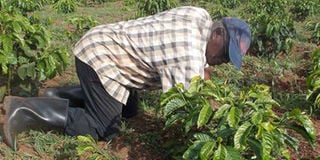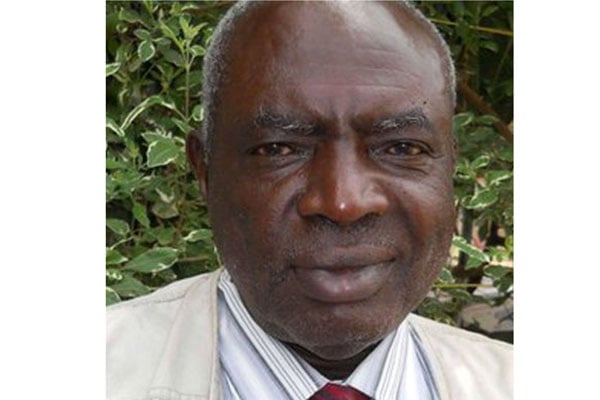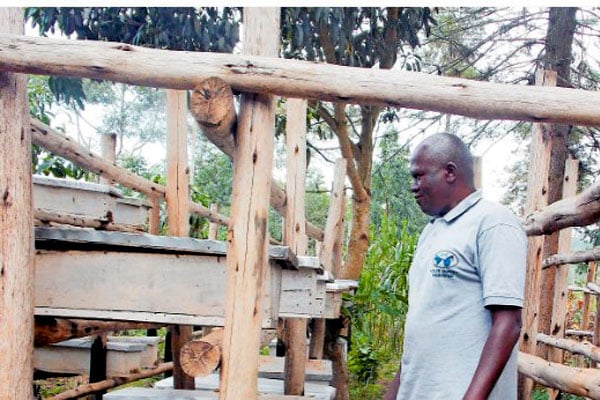Prime
Former minister Ssendaula pitches camp in the garden

Mr Gerald Ssendaula removes weeds from a coffee plant at his Kyabbogo farm. Photo by Michael Ssali
Former Ugandan Minister of Finance, Gerald Ssendaula, 74, is in his happiest mood when he is at his farm on top of Kyabbogo Village, Kingo Sub-county, Lwengo District. This is what he told Seeds of Gold recently in an interview that took place as he took this writer around the 60-acre farm on which he mainly grows coffee and bananas.
“This is my birthplace,” he said. “My mother is buried right here. She is the one who introduced me to farming and taught me to find joy in doing physical work.”
The retired professional banker and politician, actually, owns of a number of commercial farms and residential houses in different parts of his native Buganda region but he has chosen to spend most of his retirement time at Kyabbogo where both his parents are buried. He is blessed with good health and although he has several employees on his various farms he personally participates in physical work with them.
“I particularly like pruning the banana trees myself,” he told Seeds of Gold. “There is hardly anything about growing bananas that my mother did not teach me.
How he started
As a schoolboy he would spend his holidays at Kyoko Village where his grandfather who was a prominent coffee farmer taught him to value the crop and to take care of it. Today Ssendaula is not only a prominent coffee farmer but he is also the chairman of the National Union of Coffee Agribusinesses Farm Enterprises (NUCAFE), a coffee farmers’ national organisation.
Asked why he voluntarily chose to retire from politics in which he had risen to the level of cabinet minister, he replied: “I played my part and made my contribution. But I strongly wanted to return to doing what I have always enjoyed doing. Right from my youth I have enjoyed farming – working on the farm and watching my animals and my crops.
Even when I worked with Barclays Bank decades ago I practiced farming and most of the money that I earned was invested in buying land and farming. I still serve my government in an advisory capacity, but do not talk to me about going back into politics because I am a lot happier as a farmer. Here I am my own master but I did not personally own that cabinet job.”
Cagey about numbers
He has a rather wicked sense of superstition and although he keeps a clear record of all his animals and farming activities he will not disclose to a stranger exactly how many cows he has.
He says that traditionally a herdsman does not count his animals to avoid the risk of death visiting them.
Mixed farming
The retired politician owns a square mile of land at Kabale Village near Lwamaggwa in Rakai District where he keeps Frisian cows and also grows Robusta coffee, bananas, and other crops.
He further owns two square miles at Matalama in Ndagwe Sub-county, Lwengo District where he keeps hundreds of beef cattle, more than 600 goats, and 300 sheep. He owns another two square miles at Kaabagala near Kinoni Town in Lwengo District where he grows coffee and cows.
All the milk from his farms in the region is sold in Masaka, at milk shop along Elgin Road. He has more than 25 acres of land at Maziba in Mpigi District where he has established what he refers to as a city of animals – 400 pigs, 11 acres of Robusta coffee and nine acres of Gonja (plantains) bananas. Ssendaula further owns 25 acres of land at Burongo near Nkozi where he has coffee and bananas.
At Kyabbogo Village, where he has built a magnificent bungalow, he has so far planted some 40 acres of cloned Robusta Coffee that is also resistant to the dreaded Coffee Wilt Disease (CWD). The young coffee trees only planted last year in April, are already bearing coffee cherries. What makes his farm tick? Ssendaula has mastered best agronomic practices.
“We applied goats’ droppings as manure,” he revealed. “And we did some irrigation.” He has used Makerere University Professor of Soil Science, Julius Zake, to examine the soil on his farm and to advise him on what soil nutrients need to be applied. Zake has also advised him where on the farm he can drill water.
So far he has been using water from the public water system but he prefers to use his own water drilled from the ground, which he intends to do sometime in the future. Picks positives from Brazil He has been to Brazil and other coffee growing countries and he believes that Uganda should copy a few things from those countries in order to increase coffee production. “We should change the spacing of the coffee trees in the gardens and use more manure,” he said.
“Actually on this block we have planted 800 trees instead of the usual 450 trees per acre and in the next block we will have over 1300 trees on an acre as is the case in Brazil.” Advice He is so passionate about coffee production that he believes that if Uganda took enough interest in developing the coffee crop it would be able to finance its national budget. He further urges government to come up with a coffee law in order to improve the quality of coffee.
“Many farmers continue to mishandle the crop but we do not have a law in place that we can use to punish such people. Yet in order to compete effectively with other producers our coffee quality should be quite high.” He does not drink milk but he does not want to live in a place where there are no cows. “We will want to use bio-gas in the future and we need the animals to get cow dung which we will also use as manure,” he said. “So we will soon have some five cows or so here for zero-grazing.” So far he has been bringing in trucks of cow dung and goat droppings from his other farms.
Benefits of mixed farming
Mixed farming is good for the environment since it’s quite sustainable according to thought Co. in addition, the crop-livestock farming system provides a variety of financial benefits. it offers a high return on the work of the farm since all products are utilized says agriinfo.
Feed and fertilizer do not need to be purchased to support the growth of crops or maintenance of livestock, saving money. the system provides work throughout the year, and it also offers a multi-pronged approach to income, so that if a crop does poorly in a given season, the farmer can fall back on income from sales of meat, milk or eggs.
one disadvantage to mixed farming is that a farmer will require more resources, such as tools and equipment, to care for livestock and crops simultaneously, than would a farmer engaged in just one such line of business.. also, additional education is typically required to provide the background necessary to enable a farmer to maintain a mixed farm
What is mixed farming?
Mixed farming is defined as farming involving two or more enterprises. For instance, raising livestock and crops simultaneously and in the same location can be explained as mixed farming. the manure produced by the livestock is used to produce better crops, and the crops can, in turn, be used to feed the livestock. this provides environmental balance and also supports a sustainable system




